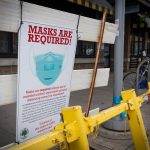
Face masks on display in a shop in Ann Arbor. Torrence Williams | Washtenaw Voice
By Cydney Heed
Staff Writer
As the COVID-19 pandemic continues to upend lives, health experts are learning more about how to prevent and treat the virus.
Although cases in Michigan have been creeping up since the state entered Phase 4 of its Safe Start Plan in June, deaths have remained low due to better treatment protocols and more cases among younger, healthier people.
“We did, just in the last 3 or 4 days, start to see a bit of an increase…the majority of those continue to be in younger adults,” said Susan Ringer-Cerniglia, a spokesperson for the Washtenaw County Health Department. “It’s not unrelated to our colleges and universities, and particularly U of M, where we’re seeing a little bit more of an increase.”
However, even though cases have risen slightly, deaths have remained relatively low. Cerniglia says that this likely has to do with increased testing picking up milder cases, as well as increased cases among young people and improved treatments.
“Certainly our healthcare providers and hospitals have learned a lot about treating COVID patients at this point,” Cerniglia said.
With the weather turning cold and the holidays just around the corner, concerns have risen in regard to indoor gatherings and air circulation.
Cerniglia said, “We do already know that confined space and indoor space and places without a lot of airflow do present more likelihood of transmission.”
Cerniglia did note that health experts are unsure whether the virus is truly airborne, meaning that it actually circulates in the air, or if the spread is occurring because of respiratory droplets that eventually drop to the ground.
- A billboard donated by the City of Ann Arbor. Torrence Williams | Washtenaw Voice
- A reminder to keep physical distance at Nickels Arcade. Torrence Williams | Washtenaw Voice
- Signs in Downtown Ann Arbor depict COVID-19 restrictions and the present normal. Torrence Williams | Washtenaw Voice
- Signs in Downtown Ann Arbor depict COVID-19 restrictions and the present normal. Torrence Williams | Washtenaw Voice
- Sign on a blockade in Downtown Ann Arbor informing pedestrians about COVID-19 restrictions. Torrence Williams | Washtenaw Voice
She also cautioned that the holidays may have to look a little different this year.
“Certainly we want to discourage folks about having parties or doing everything the way they normally would. But you can proceed forward and still have some of those celebrations with some more precautions, like keeping things outdoors and keeping things smaller,” Cerniglia said.
Although hospitals are not overwhelmed right now, there is some concern that combining the COVID-19 pandemic with the regular flu season could put them close to their capacity.
Cerniglia said, “Typically in what we would call a fairly normal flu season, our hospitals do get close to or at capacity with their inpatient cases.”
In order to keep hospitals from being stretched too thin, health experts are encouraging everybody to get the annual flu vaccine.
“We don’t want people having both flu and COVID, so we’re really pushing this year to make sure folks get that seasonal flu vaccination,” said Cerniglia.
Here at WCC, faculty and staff from all departments continue to work to keep students healthy.
“In my opinion, the college has put in place excellent procedures and went up and above to ensure that this environment can safely operate in this pandemic,” said Scott Hilden, chief of public safety at WCC.
WCC has instituted numerous safety measures for in-person classes, including symptom screenings, temperature checks, mandatory masks and social distancing, and improved air quality.
Hilden said, “The college went to great lengths to ensure that the air circulation and the air quality in all the rooms that are having classes is at a high level.”
Hilden indicated that the symptom screenings and temperature checks appear to be doing their job, saying, “I know of two instances where repeated temperature checks continued to show a temperature over 100.4, and they were turned away.”
Cerniglia emphasized, “We’re still in the pandemic, the virus hasn’t gone away, nothing’s really changed about that, but how well and how effectively can we keep the virus from spreading. And if we can, then we can kind of keep going with our new normal.”






